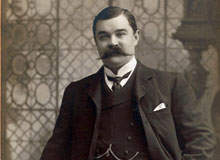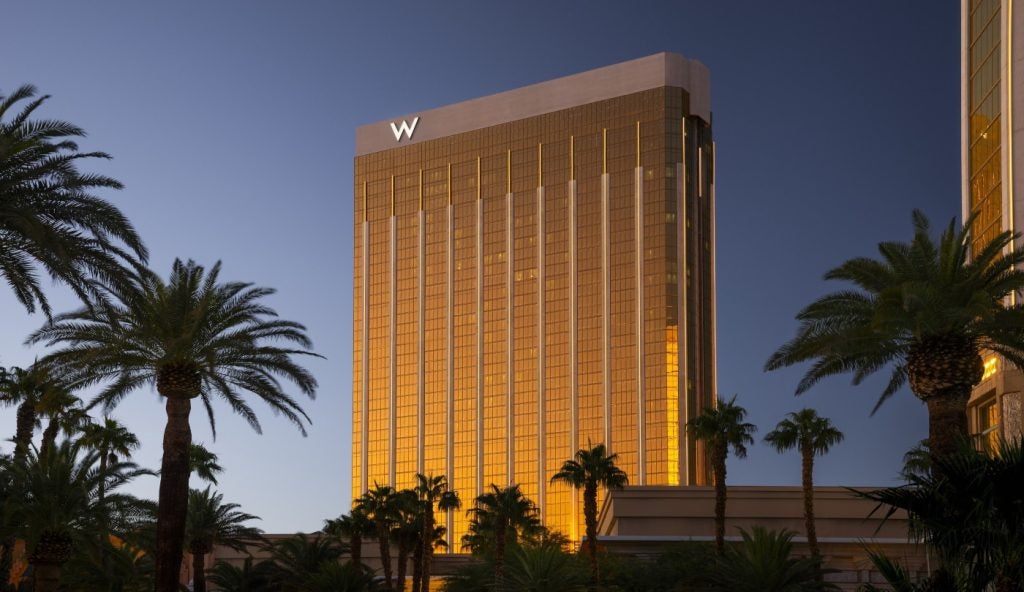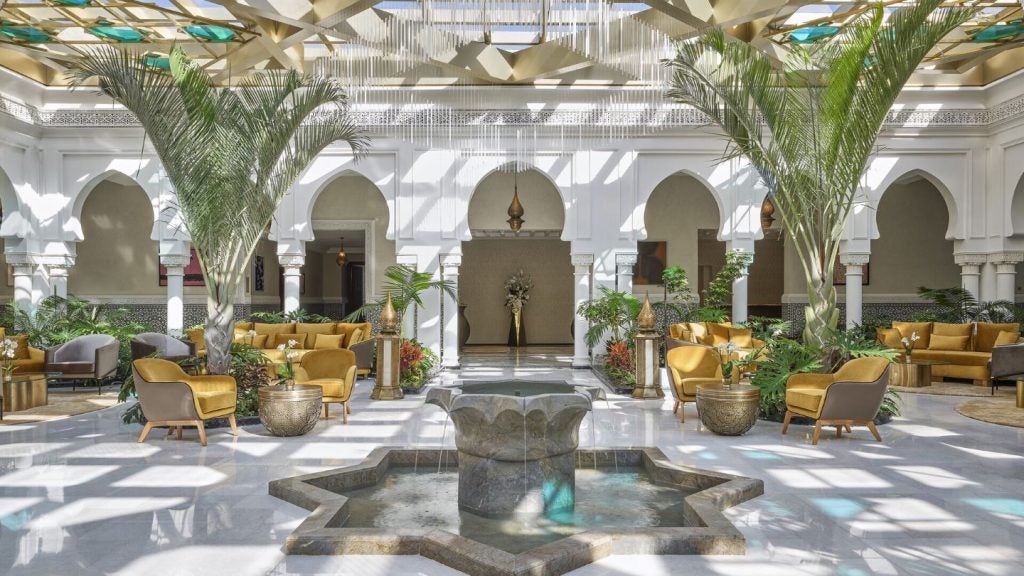
It is a longstanding British tradition that on your 100th birthday you receive a telegram from the Queen. In normal circumstances this applies to individuals rather than institutions, but for the Goring even Her Royal Highness is willing to break with protocol.
The hotel received its missive earlier this year, marking what has been a quite incredible 100 years of service. While most centenarians must make do with a personalised message, however, it can be assumed that the Goring’s congratulations from Buckingham Palace have been delivered in person. After all, this was the Queen Mother’s favourite London hotel and has often been described as an annexe to the palace, which lies a brief carriage rides from its front door.
Royal connections are all well and good but, from a romantic hotelier’s perspective at least, what makes this a real moment for celebration is the marking of a milestone for what is now the capital’s last fully-independent, family-owned and operated five-star hotel.
In what can feel like a throwback to a forgotten age, just four Gorings have been at the helm since its inception.
Furthermore, success has always been achieved on their own terms; while the London hotel scene has changed beyond recognition, the Goring has retained an autonomous, somewhat eccentric spirit, unique amid the throng of multi-national operators and private equity firms.
Fathers and sons
How well do you really know your competitors?
Access the most comprehensive Company Profiles on the market, powered by GlobalData. Save hours of research. Gain competitive edge.

Thank you!
Your download email will arrive shortly
Not ready to buy yet? Download a free sample
We are confident about the unique quality of our Company Profiles. However, we want you to make the most beneficial decision for your business, so we offer a free sample that you can download by submitting the below form
By GlobalDataWhen the Saxony-born Otto Richard Goring opened the Belgravia property on 2 March 1910, the world’s first hotel to offer ensuite bathrooms and central heating as standard, the room rate was seven shillings and sixpence. Sixteen years later it was the turn of his son, Otto Gustave, to take over as managing director. He steered the hotel through two coronations, the Second World War and the years of austerity that followed, finally standing down in the 1970s and ceding control to his eldest son, George.
Jeremy Goring, is the latest incumbent, having inherited the keys in 2005. As we sit in the garden over a pot of tea, staff busily prepare for a Castle of Mey fundraiser being held that evening. “It was the Queen Mother’s favourite,” he informs me. Security has also been out in force due to the likely presence of a particular VIP. The chief executive is far too discrete to drop any names, but a bit of snooping reveals that VIPs do not come much bigger; I’m sworn to secrecy. For Jeremy, however, the secret of the hotel’s success is about far more than longstanding connections to the great and the good.
“I think back to our birthday party in March,” he begins. “We might be a posh hotel, but the mix of people there was representative of what makes us special. There were Spice Girls, royals, grandparents and grandchildren, old members of staff and their families.
“That really summed up what we’re about. Anyone can come here and feel at home; we’ve never been one of those hotels where you walk in and the staff look you up and down, checking if your shoes are polished. It’s not the way we’ve ever operated and a great deal of that is down to my dad, who’s a fairly eccentric and very welcoming guy.”
George may have left the frontline five years ago, but his identity is still stamped all over the place, be it the wooden sheep in each room or the wonderfully haphazard biannual newsletter, the Goring Trumpeter, which can feature a photo of Baroness Thatcher and Henry Kissenger posing in the lobby on one page and an update on George’s piglets the next. Jeremy attributes his father with having “turned what was a nice four-star into an unrecognisable five-star”.
Mention of his predecessor’s name elicits exasperation and affection in equal measure from the son, who has inherited what must feel a daunting legacy, but George is clearly proud of Jeremy’s achievements. “I left convinced I was the best hotelier there ever was,” he tells me. “Nobody could run this place as well as I did. About a year into retirement, however, I realised Jeremy is doing an even better job than me. He has brought with him a host of brilliant new ideas that I now see were needed.”
He freely admits to stopping in once a week or so, but it is clear that full control has been ceded to the new generation. This cannot have been easy for a man whose life story is inseparable from that of the hotel – he was born in room 114 and went on to spend 43 years in charge – but, in his eyes, it was the only choice.
“There’s nothing worse than an interfering father,” he believes. “That said, my mother was the worst of all. When I took over she’d arrive unannounced and run her fingers along all the ledges: ‘George! Will you come and look at this.’ I learnt a valuable lesson from that experience, but still planned to stay on a year or so. When Jeremy arrived, however, he was so natural with everyone, so confident, that I knew that that wouldn’t be necessary.” George moved the contents of his office into a small bedroom on the fourth floor, Jeremy’s surfing photographs replacing the snaps of Prince Charles’ christening cake “along with all the other old boring stuff” and the curtain came down on almost half a century’s-worth of service with the minimum of fuss.
“It was a ballsy move and took a lot of guts,” Jeremy observes admiringly. “I’ve seen family businesses where the transition is handled quite differently and the tension makes life a living hell for all concerned. Dad and I accepted quite early on that working together would be a nightmare and he was big enough to take a step back and tell me to get on with it. Hopefully he wouldn’t have hired me if he didn’t think I was up to it and, fingers crossed, it’s all been pretty good so far.”
Having graduated from Lausanne in 1988, Jeremy spent almost two decades “working for the enemy” before arriving at the Goring as chief executive. This included stints with Four Seasons, The Lanesbrough, Rosewood and Orient Express, in a jet-setting career that took in exotic locales from Mexico to the Caribbean to Australia. There had never been any pressure to enter the family trade, he spent very little time at the hotel as a youngster, but a stint as a 15 year-old barman on the south coast gave him the bug and proved that nature can be a far stronger driving force than nurture.
George’s trajectory was quite different. Also a Lausanne graduate, he spent several years learning the ropes in hotels across Europe but had joined his father at the helm by his mid-20s. “Perhaps I was groomed a little more than Jeremy,” he reflects, “but I fell into it out of laziness more than anything else. I attended a military school and the careers advisor would come in and demand to know who was going into the army. Half the class would put their hands up. ‘The navy and air force?’ The same number again. Then there was me, sat at the back trying to make myself as small as possible. ‘And what will your contribution to the world be, Goring?’ ‘Hotelier’ wasn’t the most macho of answers.”
In his five years in charge, Jeremy has undertaken extensive refurbishment work, bringing in David Linley to redesign the dining room and Tim Gosling and Nina Campbell for the rooms, suites, bar, lounge and terrace. He has noticed a new demographic coming into the hotel to investigate the changes, but is insistent that retaining the support of the old guard is always first and foremost in his mind.
“I’ve never been in favour of revolution and this place simply didn’t need it,” he explains. “I think we have become known to a younger crowd, but those that were coming five years ago are still just as supportive. Ten years ago we were seen as a very nice hotel with excellent service. I think people now compare us favourably with the Claridges and Connaughts.
“The reason we do many of the things we do so well is that they’ve become second nature over time. If you look at the Connaught, they closed, refurbished and reopened. The place is still wonderful, but it does feel a little different to what was there before – not better or worse, just different. We’re more interested in retaining what we have than transforming it.” This can lead to decisions being taken that would be unthinkable in a hotel group boardroom (Jeremy jokes that what was a four-storey hotel with 100 rooms now consists of five storeys, two extensions and only 71 beds) and money being spent on elements of the experience that are often overlooked by other top-end establishments.
In conveying this point, George recalls a dinner party where the then finance director of Forte was in attendance. “He turned to me and said, ‘George, if you worked for me I’d have sacked you ten years ago. You make no return on the capital invested in the company, your wages as a percentage of turnover are in the 30s and you’ve too many good wines in the cellar and will never make any money out of them. In my organisation you’d be toast’. Some of the things I did and Jeremy has done are tremendous wastes of money, but they’re fun and our guests like them.”
Free spirit
This independent spirit has also allowed the Gorings to grow as hoteliers. “I would never have survived in a corporate hotel,” George continues. “I needed that enthusiasm and freedom that only comes with running your own place. The great thing is that you can make as many mistakes as you like and nobody will ever sack you. What makes your business great, however, is learning from those mistakes and putting the lessons into practise.” Today, there are few hoteliers benefiting from such circumstances. This contrasts from the operating environment of George’s early years and he feels the hospitality trade has lost something as a result.
“Back then more than half of London’s hotels belonged to various families,” he says. “In the years since, every single one has been sold at least once – I’ve lost count of who owns the various Marriott’s and Hiltons. It’s the same on the continent and I do believe it depersonalises the experience. What I love is that nowadays, when I return to the Goring, the guests welcome me back. That connection has been lost elsewhere.”
While he has seen other hoteliers buy yachts on the Med, George insists he never took a penny out of the hotel other than his working wage. His father warned him that he would go to Hell were he to sell one share and that message has been passed on to the new generation – “I’ll be there to stoke the flames,” he warns.
There seems little danger of that; Jeremy is equally unwavering when it comes to retaining independence. “Become part of a chain and we will die,” he exclaims. “It would take away everything our guests treasure – we wouldn’t be able to throw as many parties for starters – and while we try to be as commercial as possible, I’ve worked in big organisations; you have to make more money year-on-year. I can’t see that working here.”
George acknowledges having turned down multi-million pound offers on almost a weekly basis and says his proudest achievement is having created a superior hotel to the one he inherited. That is now the challenge for Jeremy, and his father is optimistic about his fortunes.
“My life’s work has been the Goring,” he concludes, “and I can’t tell you how proud I am to have someone take that work on. Initially I felt guilty being born with a silver spoon in my mouth, having this lovely business handed to me on a plate. But I came to realise it is also a great responsibility. Jeremy understands that inherently and I can’t ask for any more.”







